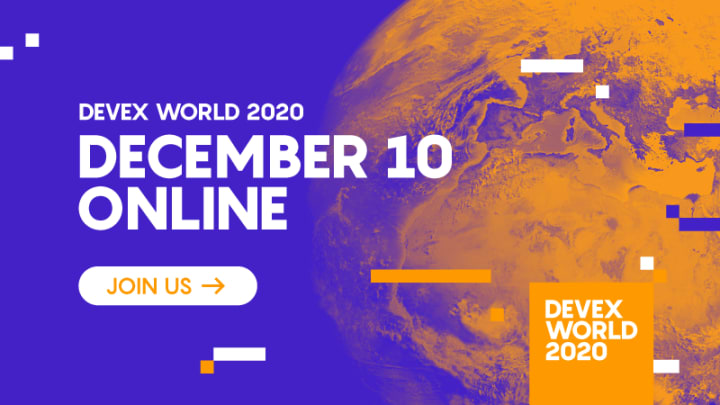Devex World, our flagship conference, is a mix of big-name leaders you know and some of the sector’s lesser-known professionals pushing the limits of innovation. In previous years, Devex World brought together over 1,000 development professionals in Washington, D.C. — but this year we met virtually, allowing more people to join from anywhere around the world.
Catch up on all of the news and insights from throughout the day with these recaps from our reporters and editors.
Read the live coverage:
6:30 p.m. — Closing plenary. Well folks, that’s a wrap. “It’s been a series of incredible conversations,” says Devex’s Raj Kumar at the close of our first fully virtual Devex World. “Hopefully you’ve learned a lot. I know I have.”
Over the course of 10 hours of panel discussions, we’ve explored everything from augmented reality in storytelling, to how best to collect and use data, to addressing racism and systemic inequities in the development sector. Our virtual format may have sprung from necessity, but it provided an unprecedented opportunity for global connection and conversation. And we hope to see all of you back here for our next Devex World.
In the meantime, if you missed anything, you can watch all of the public panels here. — Abby Seiff
6:29 p.m. — ‘Love, Actually,’ celebrity fundraising, and new narratives. In October, the charity Comic Relief announced it will stop sending celebrities to Africa, and stop using images of ill or starving people in its fundraising materials — a decision that was widely applauded.
“You more and more want the people who really know about the subject and who are really benefiting to be the ones who tell their story and explain, because you can smell the truth, rather than someone who’s just rocked up a couple of days ago,” says Richard Curtis, the British writer and director who co-founded the organization.
Curtis says he sees the need for new ideas and new stories in other aspects of his life and work too.
“I do notice the world changing fast, and I hate the idea that people would just hold to their old positions. When I look at my film ‘Love, Actually,’ there’s not enough diversity in the casting. I just accept that now. If I were making that film now it would have a completely different flavor,” he says. — Michael Igoe
6:12 p.m. — Worldwide protests show the strength of activism in 2020. Despite movement restrictions put in place to stop the spread of COVID-19, 2020 has been a strong year for protests. From the Black Lives Matter movement in the U.S. to protests against an abortion ban in Poland, hundreds of thousands citizens have taken to the streets.
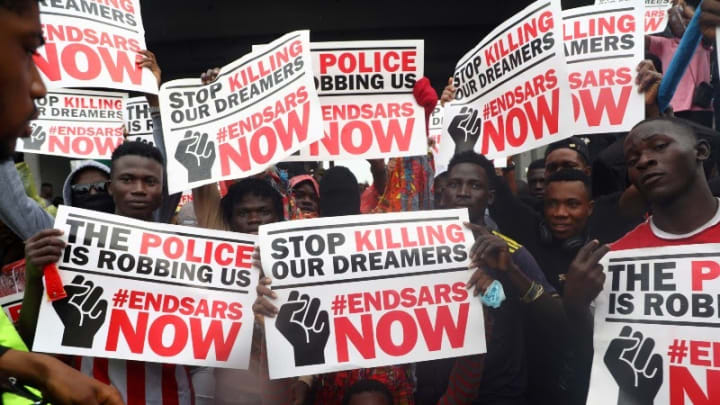
Nadya Tolokonnikova, conceptual artist and founding member of the activist collective Pussy Riot, believes this year has shown the strength of activism. “People are ready to ask really radical and really uncomfortable questions,” she says.
Tolokonnikova says that social media is an important tool, allowing activists to reach more people, and in her case, to circumvent the Russian government’s media censorship. — Natalie Donback
“People are ready to ask really radical and really uncomfortable questions.”
— Nadya Tolokonnikova, conceptual artist and founding member of activist collective Pussy Riot5:56 p.m. — Lessons from a mobile storyteller. From a woman in Kenya who’s making wigs out of plants, to the rats trained to sniff landmines, Yusuf Omar, co-founder of Hashtag Our Stories, shares the ways people are keeping hope alive across the world.
Talking about how wearable technology, augmented reality, curation of user-generated content have been accelerated in the past few months, Omar says that this marks the beginning of the decentralized process of people telling their own stories, which is crucial for the development sector.
“More angles, more perspectives, and more truth — reality is the new quality,” he says. — Amruta Byatnal
5:47 p.m. — Pandemic preparedness is an ‘active process.’ The idea of a pandemic happening wasn't unexpected, but the world was not prepared in many ways, say infectious disease experts Dr. Dennis Carroll, chair of the Global Virome Project Leadership Board, and Dr. Syra Madad, senior director of the system-wide special pathogens program at NYC Health + Hospitals.
It was not prepared for the poor leadership in many countries, including the U.S., in responding to the crisis — despite the availability of knowledge and guidelines on how to respond to such a viral threat, they say.
But as Carroll said in Netflix's “Pandemic” docuseries, every epidemic provides an opportunity to learn:
• The world "cannot rely on bubble gum and Band-Aid approaches."
• It's not enough to train front-line health workers to respond to potential infectious disease threats. They should also have the resources and tools to make decisions for what is to come.
• A global event requires a globally coordinated response.
• "Knowing your enemy" is key in winning over future threats.
"When we talk about pandemic preparedness. It's not a state. It's an active process. You need to continue to maintain that state of readiness. And [that] ... requires ongoing funding," and not a cycle of panic and neglect, Madad says. — Jenny Lei Ravelo
+ Continue reading What should change after COVID-19, according to the stars of Netflix’s 'Pandemic' series for more.
5:31 p.m. — DFC’s unfinished business. Mark Green, the former USAID administrator and executive director of the McCain Institute, has a “to do” list for the Biden administration when it comes to ensuring integration between U.S. aid agencies.
“What I think we didn’t do as well as we need to, is integration. If you don’t integrate the development portion with the DFC so they’re working hand in glove, then all you’ve done is created a commercial bank.”
— Mark Green, McCain Institute executive director and former USAID administratorDuring Green’s tenure, the Trump administration oversaw the creation of DFC, which advocates hope will open up new opportunities to drive private investment in low- and middle-income countries. DFC’s creation was accompanied by some concerns about whether it would focus enough on development.
“What I think we didn’t do as well as we need to, is integration. If you don’t integrate the development portion with the DFC so they’re working hand in glove, then all you’ve done is created a commercial bank,” Green says.
“There’s no piece of legislation, there is no act that is perfect when it first is passed. And so I think this is part of what the next administration can work on, is to strengthen that integration,” he says. — Michael Igoe
5:18 p.m. — Education is the ‘single lever’ to improve life chances. The pandemic has created an incredible opportunity for higher education to provide access and equality through innovation and online learning, experts say.
“If there is a single lever that can improve the life chances of everyone in the world and if we are to achieve the Sustainable Developments Goals and live no one behind, its education. So it's an imperative,” says Sanjeev Khagram, director-general and dean of Thunderbird School of Global Management.
In her call to action, Address Malata, vice-chancellor at Malawi University of Science and Technology says “ There has to be investment if we are going to reach the rural student, the student who has nothing.”
“No student should have no access to higher education in the 21st century. I think all of us donors, partners, governments… should make commitments… so let’s invest,” she says. — Rumbi Chakamba
4:52 p.m. — Rory Stewart on British aid and politics. Rory Stewart, former Secretary of State of the now-defunct Department for International Development, analyzes the place of aid in British politics and the country’s international posture.
1. Scrapping DFID and the 0.7% of gross national income target was the result of “classic populist anxiety” and has “huge implications” for development, according to Stewart. He says he doesn’t believe the government will return to spending 0.7% on aid again.
2. The next government will need to regain voter confidence in development if it wants to restore the U.K. development position.
3. The development sector “needs to put climate and the environment at the heart of what we do,” says Stewart.

“Britain really has no choice other than to lean into the world,” Stewart tells Devex’s Raj Kumar. “Whoever follows in politics they have to rediscover their confidence. That’s about getting away from a colonial past … it’s about partnering with other people. I think that development aid, sensitively thoughtfully done, is of course absolutely at the core of living out our values in a global world.” — Will Worley
+ Continue reading: Ditch the jargon to save development, says Rory Stewart
4:40 p.m. — ‘There will be no vaccine for climate change.’ Christiana Figueres, former executive secretary at UNFCCC, and Hindou Oumarou Ibrahim, environmental activist and expert on Indigenous people’s adaptation to climate change, discuss the climate fight in 2020 — from the pandemic’s impact to the U.S. election to the postponement of COP 26.
“There will be no vaccine for climate change so that’s why we need to change our behavior and act on it.”
— Hindou Oumarou Ibrahim, environmental activistFigueres says it is difficult to generate the same sense of urgency around climate change as the pandemic because the latter is “acute” while many of the issues around climate change are “chronic.”
“That sparks a different reaction in our puny little human brains, and so that sense of urgency is one that honestly I think is still going to be very difficult [to generate around climate],” she says.
But Ibrahim, who is from a pastoralist community in Chad, counters that the problems of climate change are already acute for many communities around the world.
She says that convincing people to change their behavior to protect themselves and others is even more important when it comes to climate. “There will be no vaccine for climate change so that’s why we need to change our behavior and act on it,” she says.
Both speakers also describe their hopes that the new U.S. administration could start rebuilding some of the international relationships and responsibility on climate.
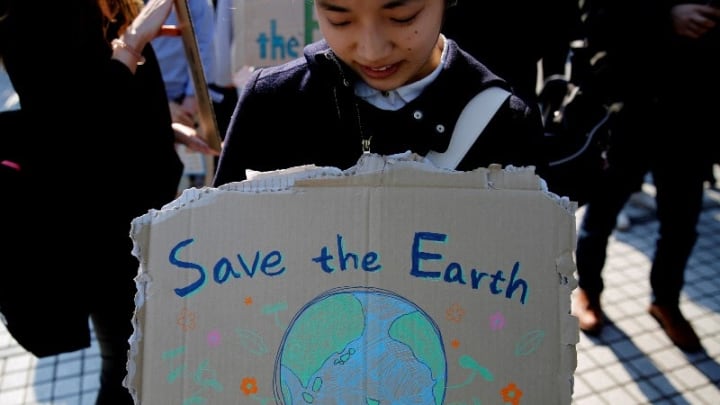
“It is not only about the environment or climate … it is about solidarity, how all of us can act together, and that gives a lot of hope for people like me … We need to combine all the social, the racial, the gender and the environmental issues to better transform our world,” Ibrahim says. — Jessica Abrahams
+ Continue reading: US election marks return to 'climate responsibility,' says Paris Agreement architect
4:14 p.m. — Can data be shared without breaching privacy and human rights? Data has been an important tool to identify at-risk groups and implement programs to respond to the health, economic, and social impacts the pandemic has created. But even in a pandemic, the need to share data has to be balanced with privacy and human rights — a challenge that continues to grow daily.
“Complexity of the privacy issues have increased a lot … we do need more international guidelines and standards and discussion around this,” says Shaida Badiee, managing director of Open Data Watch.
“Increasingly more data is available, but … the skills that are needed or some of the simple digital technology to access the data are lagging behind.”
— Agnieszka Rawa, managing director of Data Collaboratives for Local Impact, MCCWhile new data from Open Data Watch shows governments globally are increasing access to official statistics as open data, challenges remain on impact in remote and regional communities.
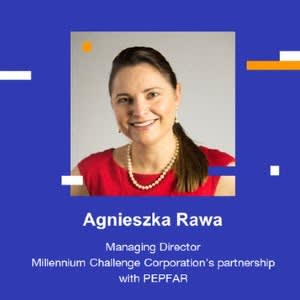
“Increasingly more data is available, but one of the main barriers that we’re seeing is … the skills that are needed or some of the simple digital technology to access the data are lagging behind — particularly in those rural areas in local communities,” says Agnieszka Rawa, managing director of Data Collaboratives for Local Impact with MCC.
For Rawa, more tools, training, and conversations are needed to move from data sharing to local empowerment that maintains privacy — but Joe Cannataci, U.N. special rapporteur on the right to privacy, says that in today’s data-driven world, data sharing and privacy cannot work together.
“36 years ago I would have agreed that anonymization [of data] is appropriate,” he says. “But today, I can’t do that. With big data, even if you anonymize it's not enough.” — Lisa Cornish
3:44 p.m. — ‘Strong resilient health systems are essential.’ The key services that Smile Train and its partners provide are cleft lip and palate surgeries to children in low-resource settings around the world. Even though these surgeries are delayed during the pandemic, the organization has found other ways to stay connected with its patients, Smile Train's CEO Susannah Schaefer tells Devex’s Raj Kumar.
“We know that strong resilient health systems are essential if we want to achieve universal health coverage or SDG 3 on good health and well-being.”
— Susannah Schaefer, CEO, Smile TrainThis includes providing nutritional support virtually so that kids are strong enough for their surgeries when the time comes, as well as speech therapy and psychosocial support. She says the organization is committed to building up the capacities of its local partners and working to invest in health systems as a whole.

The organization’s new partnership with Lifebox is one example of this, working to provide resources to help ensure safe cleft surgeries — but that are also useful for other health purposes. The pulse oximeters they provide, for example, are also important in managing COVID-19.
“We know that strong resilient health systems are essential if we want to achieve universal health coverage or SDG 3 on good health and well-being,” she says. — Sara Jerving
3:30 p.m. — ASU Devex World Hackathon: Data Revolution winner announced. Over the past few months, Devex and Arizona State University have been hosting a global hackathon. Categories were designed alongside the five Devex World themes, each with its own problem statement related to the theme and a specific SDG. Twenty universities from six continents participated in the hackathon, and 37 teams submitted entries across 5 categories.
In the Data Revolution category, entrants were asked to design an application that uses data for societal good while simultaneously guaranteeing the privacy of individuals.
The winner is a project called “A Thermal COVID Approach” from a team with ASU. Austin Brown, one of the creators behind the project, says an internet connected thermal camera, mounted at high foot traffic areas, combined with an artificial intelligence algorithm could generate real-time data about potential COVID-19 outbreaks in a local area. — Rebecca Root
3:27 p.m. — Data in development. The COVID-19 pandemic and its economic fallout have highlighted the necessity of rigorous, reliable, and comprehensive data. But such data is only as good as its objective and intention. And in order for organizations to use data as effectively as possible, there must be a data culture in existence in the first place.
“The desire and thirst for data must come from the top and go all the way down the organization,” advises Harpinder Collacott, executive director at Development Initiatives. Without these, organizations will find themselves with plenty of data and little sense of how to utilize it.
Transparency and reproducibility are critical, says Maria Ruth Jones, development impact evaluation coordinator at the World Bank. She urges organizations to be rigorous about their data quality and invest in the right human resources.
“The desire and thirst for data must come from the top and go all the way down the organization.”
— Harpinder Collacott, executive director, Development InitiativesIn recent years, data collection has improved and proliferated, as the availability of quality open-source datasets and partnerships have allowed an unprecedented chance for organizations to gain insight into needs and outcomes. And as COVID-19 has impacted traditional data collection methods, alternatives are showing their value.
Facebook’s 4-year-old Data for Good initiative, for instance, uses artificial intelligence and social media to complement more traditional sources of data. During the panel, Laura McGorman, policy lead at the initiative, announces that the tech giant is launching a series of datasets on business trends, economic insights, and more to aid with targeted recovery for small businesses and communities affected by COVID-19. — Abby Seiff
2:58 p.m. — As NGOs move to messaging, WhatsApp goes into learning mode. This year, as NGOs transitioned much of their work from in person interactions to mobile phone messages, many of them turned to WhatsApp.
“It’s simple. It's personal. And it's private. … As we start to work with businesses and international organizations and NGOs, we want to make sure that we stay true to that promise.”
— Nmachi Jidenma, global strategy and business development lead, WhatsAppThe Facebook-owned messaging platform, which has 2 billion monthly active users, has modified its business tools for NGOs.
Now, WhatsApp has to consider the trade-offs between helping NGOs reach communities at scale while preserving the experience that has made the platform so popular.

“It’s simple. It's personal. And it's private,” says Nmachi Jidenma, global strategy and business development lead at WhatsApp. “As we start to work with businesses and international organizations and NGOs, we want to make sure that we stay true to that promise.”
WhatsApp is in learning mode, she added. — Catherine Cheney
+ Read more about WhatsApp’s partnership with WHO, and stay tuned for future coverage as the company ramps up its engagement with the international development sector.
2:41 p.m. — Scaling innovation successfully. Scale is a distant dream of a solution reaching its potential, Devex Senior Reporter Catherine Cheney says during an event about innovation at scale. And in the development world, the promise of innovation is often touted while failure to scale solutions is a topic that doesn’t receive as much attention.
“We need to understand what is working and how," says Rahul Chandran, CEO of Care Impact Partners, who previously led the now-shuttered Global Alliance for Humanitarian Innovation. “In failure, we can hopefully learn how something better and bigger can grow back.”
Alexis Bonnell, senior business executive and emerging technology evangelist with Google Cloud, gives the Million Lives Club initiative as an example that others looking to scale can learn from. It was technology-enabled, data-driven, and evidence-focused. Million Lives Club was also "obsessive about their customer experience" and not as concerned with pleasing donors. "That is what every great donor would want to see."
Iyinoluwa "E" Aboyeji, general partner and co-founder of Future Africa, says high impact should not be disassociated from high returns. One such strategic investment: connectivity and the digital divide, which has become even more apparent during the pandemic. “We should be putting more aid money into building that infrastructure, because no one else can take that risk,” Aboyeji says.
Experts also call for more customer-centric approaches, which break down the "false wall" between social impact and returns while providing greater accountability.
“I want funders to be more accountable for impacts or hungrier for impacts — and for people like me to get fired if they don't produce impact,” says Kevin Starr, managing director at the Mulago Foundation. — Amy Lieberman
2:17 p.m. — ASU Devex World Hackathon: Innovation at Scale winner announcement.
In the Innovation at Scale Category, entrants were asked to design an innovation in an education system that would make it more equitable and inclusive.
The winner is Appear.ed with the De La Salle University in Manila, Philippines. Sephi Marz Liclican, one of the winning team’s members, described Appear.ed as an education assistant for learning and mental health needs. “We aspire to establish an academy where engagement is prioritized to sustain both productivity and sanity amidst the new normal and beyond,” he says. — Rebecca Root
2:13 p.m. — ‘Geography is the science of our world.’ With geographic information systems, decision-makers can not only analyze — but also visualize — data from a range of sources.
The pandemic has led to these tools being “recognized in a whole new way,” says Jack Dangermond, founder and president of Esri, the industry leader in GIS.
Global development professionals can use spatial frameworks to bring information together to work on complex, interconnected problems, such as the SDGs. — Catherine Cheney
2:06 p.m. — The COVID catalyst: Improving access to vaccines. Ronald T. Piervincenzi, CEO of USP, says every COVID-19 vaccine produced will require different storage conditions, delivery volumes, and numbers of doses, creating a lot of complexity for the health care worker and the pharmacist on the front-lines of delivery.
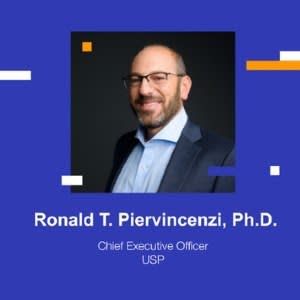
Such challenges, although surmountable, could jeopardize the speed of rollout, he says, adding that if equitable access to a vaccine — specifically to low- and middle-income countries — isn’t seen in the early part of 2021, pressure will become severe.
According to the People's Vaccine Alliance, if more isn’t done to ensure there are enough doses, 9 in 10 people may not be vaccinated in up to 70 lower-income countries next year.
Mimi Darko, founding member and chairperson of the African Vaccines Regulatory Forum and head of Ghana’s Food and Drug Administration, says they’re already working with policymakers to see how the regulator can ensure that, when the vaccine does arrive, it will get to the user at the right quality, there will not be any safety issues, and there’ll be a continuous supply.
“For us, there are lots of questions but there are also lots of solutions … We hope that those solutions will work to ensure that we can all get good quality vaccines at the right time for us in this part of the world,” she says. — Rebecca Root
1:42 p.m. — Financial services for women and youth. Papa Amadou Sarr, minister general delegate for entrepreneurship in Senegal, says he believes there needs to be a shift in official development assistance “towards supporting entrepreneurship and private sector development because it is in this area that value creation happens.”
“That the entrepreneurs, in particular youth and women … create jobs and contribute to the global GDP, rather than investing all in public sector or infrastructure that will not so often have a trickle-down effect on the job creation.”
He continues to say that:
• Entrepreneurship should be promoted at national and international forums such as Davos.
• Global leaders should consider allocating a certain percentage of their GDP to the private sector and entrepreneurship. — Rumbi Chakamba
1:25 pm — Peter Sands on links between health and the economy. The ACT Accelerator is still well short of the funding it needs to support the development and distribution of COVID-19 therapeutics and vaccines. Now it needs the “kind of boldness of response” that wealthy countries have shown in their domestic spending when it comes to accelerating the development of new tools and ensuring equitable access to them, according to Peter Sands, the executive director at the Global Fund to Fight AIDS, Tuberculosis and Malaria.
“I’m hoping that now that people are really looking at the interaction between health and the economy, they don’t just look at the downside risks, but they look at the upside benefits.”
— Peter Sands, executive director, Global Fund to Fight AIDS, Tuberculosis and Malaria• Overstretched development assistance budgets won’t be enough, but most of the funding for these global public goods is going to come from governments — potentially through grants, International Monetary Fund Special Drawing Rights, or debt relief.
• COVID has “delivered a very powerful lesson on the interdependence of health and the economy,” he says. While countries will have smaller total budgets, it is important that health gets a larger share and that those allocations are done as efficiently as possible.
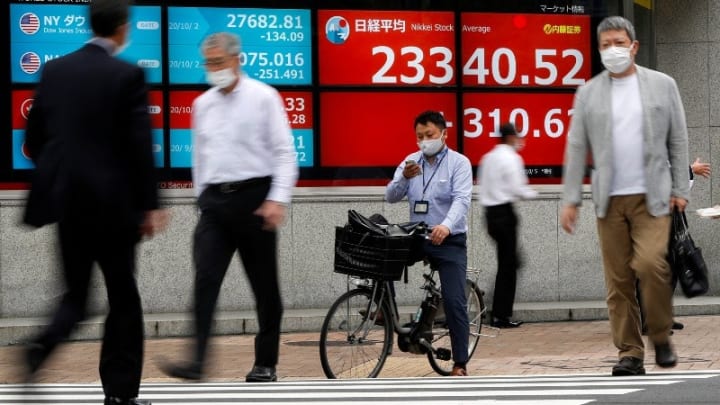
• “I’m hoping that now that people are really looking at the interaction between health and the economy, they don’t just look at the downside risks, but they look at the upside benefits,” he explains. — Adva Saldinger
1:09 p.m. — ASU Devex World Hackathon: Future of Development Finance winner announcement.
In the category of Future of Development Finance, entrants were asked to design a cash transfer system for individuals that could provide resources rapidly, efficiently, and equitably in emergency situations.
The winner, a project called OneStep by Tec de Monterrey in Monterrey, Mexico, created an app to allow people to easily donate money to charities and NGOs. Santiago Aguirre Gómez del Campo, a OneStep team member, says creating a more accessible and safe way to donate could mean an increase in giving which in turn can further support efforts to alleviate poverty. — Rebecca Root
1:07 p.m. — COVID-19, the SDGs, and the development finance agenda
Speaking about the G-20 common debt framework Vera Songwe, executive secretary of the Economic Commission for Africa, says though the common debt framework is welcome and is an important first step for debt restructuring, there still needs to be more clarification on how it will work. There is also a need to look into where the private sector comes into the conversation, as a lot of the debt on the African continent is private sector debt.
Eric LeCompte, executive director of Jubilee USA, adds that the framework is real progress, but there are areas where it is not going to be enough — for example, it fails to address the needs of middle-income countries.
“When we are looking at the majority of job losses, increase in famine rates, the increase in poverty as well as some of the countries most affected by the coronavirus crisis, we are talking about middle-income countries in Africa, in Latin America, in Asia and these countries right now are largely left out,” he says.
Geoffrey Okamoto, first deputy managing director of IMF, adds that IMF recognizes that this is a unique time where countries are faced with unique challenges and the organization aims to “strike the right balance and meet countries halfway in this [debt restructuring]” as “no countries asked for a global pandemic.”
Looking ahead to 2021 panelists say the most important things ensure progress in financing for development include:
• Getting additional liquidity.
• Controlling the health crisis.
• Financing SMEs in emerging markets by matching the gap of institutional finance and the needs on the ground.
• Raising the relief, aid, and financing needed to stop countries from sliding into lost decades of financing — Rumbi Chakamba
12:28 p.m. — How the pandemic can revitalize development and aid. “Building back better” after COVID-19 — it's a phrase we have all been hearing again and again, but what does that actually mean, and what will it require?
• The old ways of development won't work, says Paul O'Brien, vice president at Oxfam America. "If we think our work is the way to restore the way it was before the pandemic, we are in for a lot of problems," O'Brien says.
• Elements from the “grand bargain” could provide an "excellent road map and framework for modernizing how we deliver humanitarian aid," says Nazanin Ash of the International Rescue Committee. Models of humanitarian response should recognize the protracted nature of conflicts, moving financing to longer time frames and "closer to the ground."
• Loyce Pace, president and executive director at the Global Health Council — and new member of U.S. President-elect Joe Biden’s transition team — questions how we can "flip the script" on global health. There is no reason why there isn't more cross-sector collaboration and connection, linking health to climate or to gender equity, Pace says.
• There are incentives for governments to adopt a different approach for foreign aid spending, Ash says. Unaddressed humanitarian needs, which are rising, will lead to additional unaddressed conflict and introduce "tremendous stability and security concerns."
• To get specific: There need to be "serious conversations" around the way foreign aid is distributed and where the "big money is," O'Brien says. In some ways, the pandemic has jump-started changes in the sector. Local leaders have had to directly lead more response work over the last year, Pace says. “We are going to be really hard-pressed to turn back the clock" on this trend. — Amy Lieberman
11:52 a.m. — Achieving diversity in development. As the development sector this year grapples with its shortcomings in diversity and inclusion in a way it hasn't previously, it's critical for organizations to be "comfortable with that discomfort," Janti Soeripto, president and CEO at Save the Children US, advises.
While NGO leaders may struggle to identify and rectify inbuilt biases in everything from staffing to partners, those that manage to do so stand to benefit enormously. With localization, for instance, organizations that are successful in passing the baton to local and national actors will see outcomes that are "more appropriate, more timely, and more effective," explains Yvonne Arunga, regional programs and operations director for East and Central Africa at Save the Children. — Abby Seiff
11:37 a.m. — ASU Devex World Hackathon: Communicating for Impact winner announcement.
In the category of Communicating for Impact, entrants were asked to design a knowledge network to combat misinformation and disinformation in social media.
The winning team is DoMall with the University of São Paulo, Brazil, which came up with the idea of a mobile application to help improve the literacy levels of young people and adults. Ana Laura Chioca Vieira, a DoMall team member, explained that illiteracy can affect a person’s freedom of speech, development, and the ability to exercise citizenship. “Our project helps ensure that fundamental freedom,” she says. — Rebecca Root
11:34 am — Young Nigerians are waking up. At 22 years old, Rinu Oduala is one of the leading voices — on the streets and online — in Nigeria’s EndSARS movement against police brutality.
“Young Nigerians are never lazy but opportunities seem to elude us due to political greed and lack of accountability.”
— Rinu Oduala, EndSARS activistSpeaking to another activist for social justice, DeRay McKesson, Oduala says that this protest movement has been transformational for a young generation of Nigerians, who have often been skeptical of the possibilities for change in a society of entrenched interests.
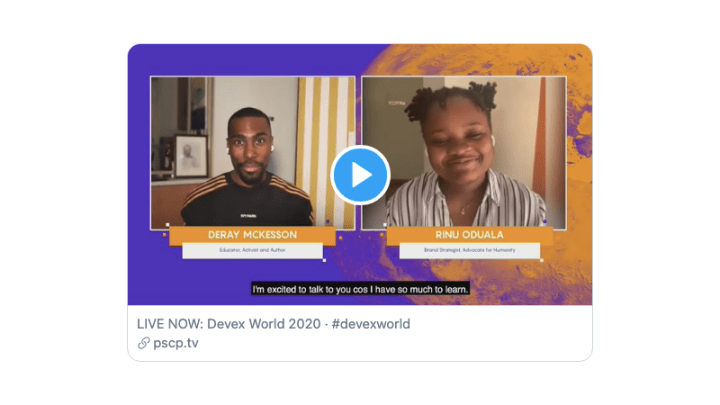
“EndSARS has broken a lot of mental chains that have subdued us and kept us defeated. Chains that have left us complacent for decades. Young Nigerians are never lazy but opportunities seem to elude us due to political greed and lack of accountability,” Oduala says. — Michael Igoe
11:11 a.m. — Preparing moonshot innovations for the real world. Delivery drones, smart contact lenses, and internet-delivered via giant stratospheric balloons. These are just a few of the technologies that have come from X, Alphabet's innovation lab, formerly known as Google X. But while the work may sound like science fiction, many of these projects are inspired by the SDGs.
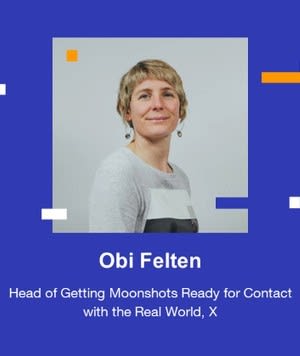
Obi Felten, head of Getting Moonshots Ready for Contact with the Real World at X, thinks some of the approaches her team is taking could hold lessons for global development professionals. Here are a few takeaways:
• The real secret to innovation is people and culture.
• Fear of failure is a barrier to innovation. “We have to overcome very powerful forces that cause people to retreat to the comfortable and the conventional,” Felden says.
• Tackle the hardest things first and figure out as quickly as possible whether your technology or program is going to work. — Catherine Cheney
11:01 a.m. — Low-tech, High Impact: Increasing Resilience of Small-Scale Poultry Producers in India. How can more smallholder farmers increase their yields without compromising health security? Sushmita Parai, senior program manager of animal well-being at Heifer International and Jason Shelton, core nutrition director at Cargill, offer a few suggestions:
• Keep solutions low tech — even if they are doing a hi-tech job, like improving biosecurity. This means they will be affordable, easy to learn to use, and adaptable to different livestock and settings.
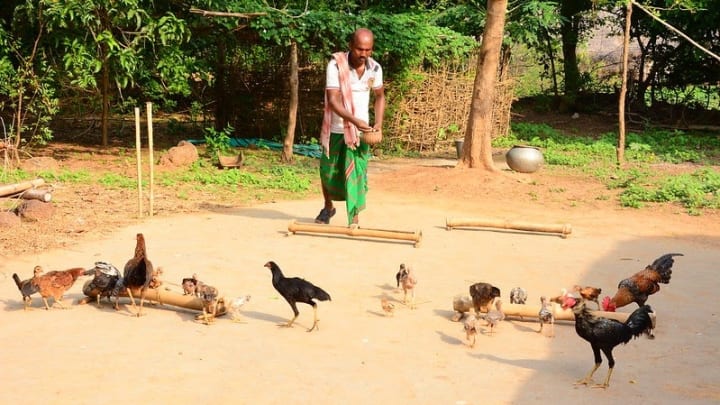
• Bird health matters economically, too. Keeping poultry in better shape means they are less likely to die and increases production — feeding more people.
• When more nutritious food is available locally, communities — especially women and girls — can eat more balanced diets. Local families are eating 22% more eggs and 67% more chicken meat since the project began in their areas. — Will Worley
10:45 a.m. — The role of the private sector in health care. The COVID-19 pandemic has underscored the critical role of the private sector in delivering health care and ensuring the continuity of services, while bringing innovations and solutions to address health challenges, not only globally but also within countries.
In Kenya, Dr. Isaak Bashir, head of the family health department at the country’s Ministry of Health, says the private sector helped fill gaps in intensive care unit beds, which many public health facilities lacked. In Nigeria, the private sector can also help in the delivery of COVID-19 vaccines, once they are made available. Dr. Samuel Oyeniyi, head of the planning, monitoring and evaluation unit at the Nigerian Ministry of Health, says the private sector has helped in reaching remote areas and even insecure locations in polio eradication efforts.
Dr. Mary-Ann Etiebet, lead and executive director at MSD for Mothers, discusses local innovations addressing local challenges. In Kenya, for instance, the organization partnered with PharmAccess to develop MomCare, which during the pandemic was able to act as a platform for women to gain information in accessing health care facilities and services. She hopes innovations like this, created in response to the needs in an emergency like COVID-19, could be maintained after the pandemic.
But multiple barriers exist in integrating the private sector in countries’ health systems, scaling up private sector-led innovations, and getting communities to access their services. Issues include government policies, bureaucratic processes, and community beliefs, but also poverty.
Dr. Agnes Binagwaho, vice-chancellor of the University of Global Health Equity and former health minister of Rwanda, says: “The level of poverty is a handicap to go and seek services when a private sector entity is near their [people’s] home.” But that is why the public and private sectors, as well as the communities, need to work together to ensure every individual, including in African countries, can access health care when they need it, she says. — Jenny Lei Ravelo
10:44 a.m. — ASU Devex World Hackathon: Business Transforming Development winner announcement: In the category of Business Transforming Development, entrants were asked if there are spaces, places, materials, or systems in a city that they might redesign, rethink, repair, or repurpose in ways that add social, natural, or economic benefits.
The winner is a team at the Kwame Nkrumah University of Science and Technology in Kumasi, Ghana called: “Design, Fabricate & Test Lower Limb Prosthetic Using Selected Recycled Solid Waste.” Jephter Kumuyi Danso, one of the team’s members, says that producing an affordable and enhanced prosthetic, fabricated from medical plastic, will contribute to clean cities while helping to improve the mobility of amputees. — Rebecca Root
10:40 a.m. — IDB chief on why the bank needs the private sector. Inter-American Development Bank President Mauricio Claver-Carone has taken the helm of the regional lending institution as Latin America and the Caribbean are facing lagging growth and outsized impacts from the pandemic. Public-private partnerships will be key to success for IDB as it seeks to foster economic development in the recovery, Claver-Carone says, and he plans to put particular focus on nearshoring and small- and medium-sized businesses.
“At the end of the day, [countries] need to create the environment to attract the private sector investment that is necessary.”
— Mauricio Claver-Carone, president, Inter-American Development Bank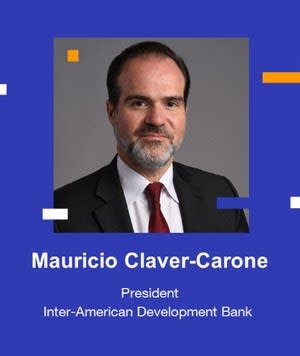
• “We don’t have all of the money in order to meet the financing needs of countries, and nor should we, right?” Claver-Carone says of IDB. “At the end of the day, [countries] need to create the environment to attract the private sector investment that is necessary.”
• He sees a major opportunity for the region in businesses that want to relocate out of China. The pandemic has made U.S. companies see the value of shortening their supply chains, he says, but they must have confidence in a new market.
• Digitalization — not only access, but price and quality of a connection — will also be key to recovery. — Teresa Welsh
+ Continue reading about Claver-Carone’s plans for the bank, including how he’ll work with the incoming Biden administration and why he’s starting an IDB climate facility.
10:31 a.m. — ‘It’s very clear to us that the food system is broken.’ Dr. David Nabarro, co-director of the Imperial College Institute of Global Health Innovation; Alejandra Schrader, TV chef; and Eric Soubeiran, CEO of the Danone Ecosystem Fund, discuss the role of business in fixing the food system. They stress the importance of collaboration, listening to different perspectives, and moving to a plant-based or better-balanced diet.
• “It’s very clear to us that the food system is broken and … as a food company we have a big responsibility in addressing this topic,” Soubeiran says, explaining that Danone is shifting to a “regenerative agriculture” model, that includes changing the system of remuneration for farmers.
“We are ready to play our part in this transition … but we need also multilateralism to work,” Soubeiran says. Businesses will also have to learn to work collaboratively, rather than in competition, he says.
• “Businesses are inside this transformation, they engage with so many people as consumers … and businesses are seen as role models,” Nabarro says. Over time, he hoped, “businesses will shift away from presenting themselves as just focused on profit ... and instead that they will be judged more and more on what they provide to societies.”
• Schrader also highlights the changes businesses are having to make in the face of consumer pressure. “More and more people are becoming aware of the relationship between food and the environment and livelihoods … so as that demand increases, we as chefs have been, in a good way, pushed towards more sustainable businesses,” she says. “People want us to talk about how we are upcycling food, how are we connecting with local farmers, and how are we holding them accountable for the sustainable practices that they are implementing. People in our restaurants … want to know where our food is coming from, and I think that’s a great motivation.” — Jessica Abrahams
9:55 a.m. — World Bank President David Malpass on tackling the pandemic and the climate crisis. Malpass says the bank is ready to step up for the pandemic response in a big way. It has already set up a $12 billion fund for low-income countries to finance the purchase and distribution of COVID-19 vaccines, tests, and treatments for their citizens, but there are many more challenges that Malpass anticipates in the months to come.
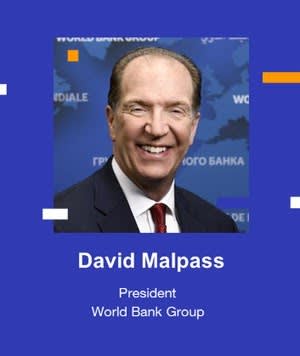
• On vaccine access for LMICs: The vaccine rollout for LMICs will face logistic and technical challenges as well as vaccine hesitancy. “Our aim is to provide fair and equitable access to people who don't have other access. We’re hoping by the end to have vaccinated a billion people,” he says.
• On the relationship with China: He is urging China as well as its commercial creditors to restructure debts by introducing concessions to help countries get over the debt distress period caused by the pandemic and attract new investors. He also emphasizes the need to have actual debt relief to avoid defaults which will be “extremely harmful to the poor, to education, to the health, to children, to nutrition.”
• On the climate crisis: The World Bank will work on the Paris Agreement through its programs by helping countries work on their nationally determined contributions. It will focus on reducing greenhouse gases by monitoring them for all countries as well as on climate adaptation for the poorest countries. — Amruta Byatnal
+ Continue reading: World Bank hopes to help get vaccines to 1 billion people, Malpass says
9.30 a.m. — How tech and philanthropy are transforming development. How can organizations attract investment from philanthropists and use those funds effectively?
Alexandria Lafci, COO at New Story, Dr. Precious Moloi-Motsepe, CEO at the Motsepe Foundation, and Neil Buddy Shah, managing director at GiveWell, speak about what they find to work.
• One way to bring in funders is to make a strong link to the long-term impacts of an intervention, such as improved education or health, Lafci says, rather than focusing only on the immediate benefit, such as access to housing.
• Coordination is key in philanthropy. When an organization is directing philanthropic funds to a program, it's crucial that its efforts are not crowding out other funders who are also working on the same interventions — leading to a lower overall impact, Shah explains.
• Having public philanthropic pledge drives can also be a way to push people to donate, creating a ripple effect, says Moloi-Motsepe.
• When working to leverage funds with high-impact solutions that might have some risk, such as targeting policy changes, it's important that there is a high bar and an understanding that these risks might come at the opportunity cost of not investing in existing cost-effective, proven solutions, Shah adds.
• But too much risk aversion is also a problem in philanthropy, meaning that worthwhile efforts are not funded, Lafci cautions: “We need to have more risk-tolerant capital earlier on in the process.” — Sara Jerving
9:10 a.m. — Ngozi Okonjo-Iweala on the WTO as an instrument of development. The World Trade Organization can be a more “forceful” tool for development and that will be a clear goal for Okonjo-Iweala, who is expected to take up the role of head of agency next year with the change in U.S. administrations. For Okonjo-Iweala, WTO needs to be an effective instrument of development, collaborating more with other international financial institutions so it is no longer siloed.
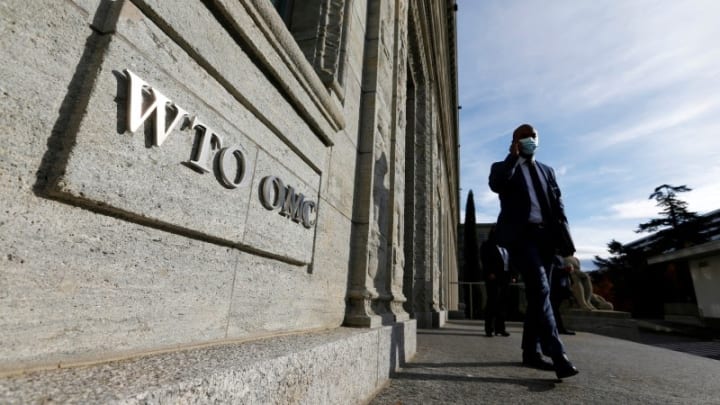
Okonjo-Iweala’s goals for the institution:
• Bring it “back to a sense of purpose.” And that purpose? To help improve living standards of people, create employment, and support sustainable development.
• Restore trust. Trust is broken not just between big powers including the U.S. and China but for low-, middle-, and high-income countries. Looking for early successes, such as on the ongoing fisheries subsidies negotiations and COVID-19 pandemic collaboration, can help establish that trust and will be early goals.
• Reform. Work to improve the paralyzed WTO dispute settlement mechanism so that the organization can function properly and help prevent trade wars.
• Inclusion. She will work on issues of women and trade and micro and small enterprises to include them in the WTO and “crowd in” those who have been left out. — Adva Saldinger
8:55 a.m. — Gates Foundation pledges an additional $250 million for COVID response. Mark Suzman, CEO at the Gates Foundation, announces an additional $250 million in support of the COVID-19 response during his conversation with Devex’s Raj Kumar.
“We’re a stopgap, we’re an accelerator, we’re a catalyst.”
— Mark Suzman, CEO at the Gates Foundation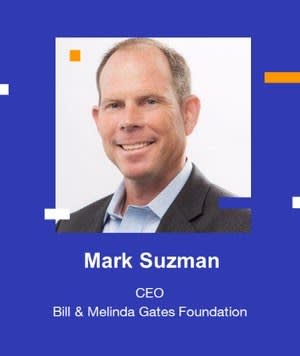
•
The latest investment is designed to support upstream and downstream investments for the COVID-19 vaccine, including the logistics of equitable distribution.
• “We’re a stopgap, we’re an accelerator, we’re a catalyst,” says Suzman, noting that public institutions like GAVI, CEPI, and WHO — all heavily funded by the Gates Foundation — will play a critical role in pandemic response.
• There is a need for investment not just in the COVID-19 response and recovery, but to prepare for future pandemics, and support primary and secondary health care, and donor countries stand to benefit. — Catherine Cheney
+ Continue reading Gates Foundation COVID-19 commitment reaches $1.75B with latest pledge for more.
8:30 a.m. — Watch the opening plenary
8:20 a.m. — Our team is gearing up for the opening plenary with leaders from the Gates Foundation, Gavi, ASU, GiveWell, the World Bank, and more, as they dive into the most-talked-about topics of the year. This article will be updated throughout the day. Follow us on Twitter for more updates.
Coming up in the next hour:
• David Malpass, World Bank president
• Ngozi Okonjo-Iweala, former Nigerian finance minister and Gavi board member
• Mark Suzman, Bill & Melinda Gates Foundation CEO
8 a.m. — Devex World is due to start in half an hour. This event is an intense day of programming and networking, exclusively for Devex Pro subscribers. Through the event platform, Pro subscribers can access a custom agenda, set up networking opportunities and 1-on-1 meetings, and actively participate in the discussions taking place.
Joining us as a Pro subscriber? We recommend getting into smart casual attire and grabbing a bottle of water. You’ll be able to pose questions and join roundtable discussions and workshops. Minimum background noise, good lighting, and clear audio are a good idea too. Not a Pro subscriber yet? It’s not too late to join the event.
If you’re joining us as a Devex reader, we’ll be updating this article regularly throughout the day from the event.
